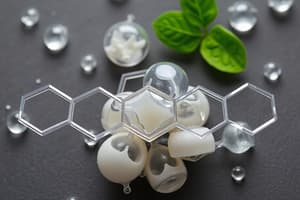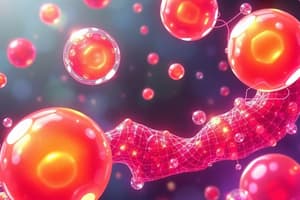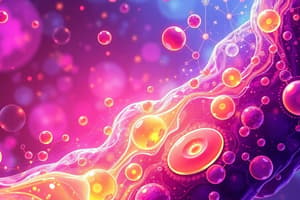Podcast
Questions and Answers
What is NOT a characteristic of lipids according to Bloor's criteria?
What is NOT a characteristic of lipids according to Bloor's criteria?
- Soluble in water (correct)
- Relationship to fatty acids
- Soluble in organic solvents
- Utilization by living organisms
Which property allows lipids to act as electrical insulators in myelinated nerves?
Which property allows lipids to act as electrical insulators in myelinated nerves?
- High solubility in water
- Combination with proteins
- Nonpolar nature of lipids (correct)
- Presence of fatty acids
What type of dietary fatty acids is believed to have beneficial effects for chronic diseases?
What type of dietary fatty acids is believed to have beneficial effects for chronic diseases?
- Saturated fatty acids
- Trans fatty acids
- Short chain saturated fatty acids
- Long chain ω3 fatty acids (correct)
Which lipids are known to have storage and insulation functions within the body?
Which lipids are known to have storage and insulation functions within the body?
Which of the following statements about lipids is incorrect?
Which of the following statements about lipids is incorrect?
How do lipids contribute to nutrition and health?
How do lipids contribute to nutrition and health?
What is the primary property of fatty acids?
What is the primary property of fatty acids?
What impact does dietary supplementation with ω3 fatty acids have?
What impact does dietary supplementation with ω3 fatty acids have?
What type of fatty acids contain branches in their carbon chain?
What type of fatty acids contain branches in their carbon chain?
Which cyclic fatty acid has been used historically for the treatment of leprosy?
Which cyclic fatty acid has been used historically for the treatment of leprosy?
What is the name of the virulence factor isolated from Mycobacterium tuberculosis?
What is the name of the virulence factor isolated from Mycobacterium tuberculosis?
How are unsaturated fatty acids that contain double bonds named?
How are unsaturated fatty acids that contain double bonds named?
What nomenclature system gives priority to the carboxyl group in fatty acids?
What nomenclature system gives priority to the carboxyl group in fatty acids?
Which type of fatty acid is derived from eicosapolyenoic fatty acids?
Which type of fatty acid is derived from eicosapolyenoic fatty acids?
What is the suffix used for saturated fatty acids with the same number of carbon atoms as the hydrocarbon?
What is the suffix used for saturated fatty acids with the same number of carbon atoms as the hydrocarbon?
Which of the following statements about branched-chain fatty acids is incorrect?
Which of the following statements about branched-chain fatty acids is incorrect?
Which type of fatty acid cannot be synthesized in the body?
Which type of fatty acid cannot be synthesized in the body?
What type of bond is present in unsaturated fatty acids?
What type of bond is present in unsaturated fatty acids?
Which of the following fatty acids is classified as polyunsaturated?
Which of the following fatty acids is classified as polyunsaturated?
How are saturated fatty acids categorized based on carbon chain length?
How are saturated fatty acids categorized based on carbon chain length?
Which of the following is a characteristic of fatty acids?
Which of the following is a characteristic of fatty acids?
Which of the following is correctly classified as a monounsaturated fatty acid?
Which of the following is correctly classified as a monounsaturated fatty acid?
What type of double bonds does linolenic acid contain?
What type of double bonds does linolenic acid contain?
Which fatty acid is considered essential due to its necessity in the diet?
Which fatty acid is considered essential due to its necessity in the diet?
What does the delta (Δ) numbering system indicate in the designation of unsaturated fatty acids?
What does the delta (Δ) numbering system indicate in the designation of unsaturated fatty acids?
Which of the following statements about geometric isomers is true?
Which of the following statements about geometric isomers is true?
What distinguishes positional isomers of fatty acids from geometric isomers?
What distinguishes positional isomers of fatty acids from geometric isomers?
Which of the following fatty acids is classified as nonessential?
Which of the following fatty acids is classified as nonessential?
How many positional isomers can oleic acid potentially have?
How many positional isomers can oleic acid potentially have?
What type of fatty acids can be derived from glucose oxidation?
What type of fatty acids can be derived from glucose oxidation?
In the omega (ω) system, what does ω7 indicate about a fatty acid?
In the omega (ω) system, what does ω7 indicate about a fatty acid?
Which of the following statements about fatty acids is false?
Which of the following statements about fatty acids is false?
What defines essential fatty acids?
What defines essential fatty acids?
Which of the following is a characteristic of eicosanoids?
Which of the following is a characteristic of eicosanoids?
Which fatty acids are classified as polyunsaturated and essential?
Which fatty acids are classified as polyunsaturated and essential?
Phrynoderma is primarily associated with deficiencies in which nutrients?
Phrynoderma is primarily associated with deficiencies in which nutrients?
Which of the following is NOT a source of essential fatty acids?
Which of the following is NOT a source of essential fatty acids?
What is one of the roles of essential fatty acids in the human body?
What is one of the roles of essential fatty acids in the human body?
Which component is NOT classified under prostanoids?
Which component is NOT classified under prostanoids?
Regular consumption of essential fatty acids can protect against which condition?
Regular consumption of essential fatty acids can protect against which condition?
Flashcards
What are Lipids?
What are Lipids?
Lipids are a diverse group of compounds including fats, oils, steroids, waxes, and related compounds. They are classified more by their physical properties (like insolubility in water) than by their chemical structures.
Why are lipids important in our diet?
Why are lipids important in our diet?
Lipids are essential components of our diet because they provide a rich source of energy. They also carry vital nutrients such as essential fatty acids and fat-soluble vitamins.
What are the health benefits of some lipids?
What are the health benefits of some lipids?
Long-chain omega-3 fatty acids, found in certain lipids, are believed to offer health benefits. They may help reduce the risk of cardiovascular disease, inflammation, and even dementia.
Where are lipids stored in the body and what is their function there?
Where are lipids stored in the body and what is their function there?
Signup and view all the flashcards
What is the role of lipids in the nervous system?
What is the role of lipids in the nervous system?
Signup and view all the flashcards
How are lipids transported in the blood?
How are lipids transported in the blood?
Signup and view all the flashcards
Why is understanding lipid biochemistry important for human health?
Why is understanding lipid biochemistry important for human health?
Signup and view all the flashcards
What are Bloor’s criteria for identifying lipids?
What are Bloor’s criteria for identifying lipids?
Signup and view all the flashcards
Essential Fatty Acids
Essential Fatty Acids
Signup and view all the flashcards
Nonessential Fatty Acids
Nonessential Fatty Acids
Signup and view all the flashcards
Saturated Fatty Acids
Saturated Fatty Acids
Signup and view all the flashcards
Unsaturated Fatty Acids
Unsaturated Fatty Acids
Signup and view all the flashcards
Monounsaturated Fatty Acids
Monounsaturated Fatty Acids
Signup and view all the flashcards
Polyunsaturated Fatty Acids
Polyunsaturated Fatty Acids
Signup and view all the flashcards
Three Essential Polyunsaturated Fatty Acids
Three Essential Polyunsaturated Fatty Acids
Signup and view all the flashcards
Carboxyl Group
Carboxyl Group
Signup and view all the flashcards
What are branched-chain fatty acids?
What are branched-chain fatty acids?
Signup and view all the flashcards
What is the "cord factor" and where is it found?
What is the "cord factor" and where is it found?
Signup and view all the flashcards
What are cyclic fatty acids and where are they found?
What are cyclic fatty acids and where are they found?
Signup and view all the flashcards
What are Eicosanoids?
What are Eicosanoids?
Signup and view all the flashcards
What is the systemic nomenclature for fatty acids?
What is the systemic nomenclature for fatty acids?
Signup and view all the flashcards
How can fatty acids be numbered starting from the carboxyl group?
How can fatty acids be numbered starting from the carboxyl group?
Signup and view all the flashcards
What is the 'omega' carbon in a fatty acid?
What is the 'omega' carbon in a fatty acid?
Signup and view all the flashcards
How are fatty acids classified based on their structure?
How are fatty acids classified based on their structure?
Signup and view all the flashcards
Delta (Δ) numbering system
Delta (Δ) numbering system
Signup and view all the flashcards
Omega (ω) numbering system
Omega (ω) numbering system
Signup and view all the flashcards
Geometric Isomers
Geometric Isomers
Signup and view all the flashcards
Positional Isomers
Positional Isomers
Signup and view all the flashcards
What are Essential Fatty Acids (EFAs)?
What are Essential Fatty Acids (EFAs)?
Signup and view all the flashcards
What are Polyunsaturated Fatty Acids (PUFAs)?
What are Polyunsaturated Fatty Acids (PUFAs)?
Signup and view all the flashcards
What are Prostanoids?
What are Prostanoids?
Signup and view all the flashcards
What is Phrynoderma?
What is Phrynoderma?
Signup and view all the flashcards
Why are Fish Oils Beneficial?
Why are Fish Oils Beneficial?
Signup and view all the flashcards
What are Some Sources of EFAs?
What are Some Sources of EFAs?
Signup and view all the flashcards
How do EFAs Contribute to Cell Structure?
How do EFAs Contribute to Cell Structure?
Signup and view all the flashcards
Study Notes
Introduction to Lipids
- Lipids are a diverse group of compounds.
- They are more closely related by their physical properties than their chemical properties.
- They are generally insoluble in water.
- They are soluble in nonpolar solvents like ether, benzene, and chloroform.
Biomedical Importance of Lipids
- Lipids are essential components of the diet.
- Fats provide high-energy content.
- Essential fatty acids, fat-soluble vitamins, and other lipophilic micronutrients are contained in fats of natural foods.
- Supplementation with omega-3 fatty acids potentially benefits various chronic diseases like cardiovascular disease, rheumatoid arthritis, and dementia.
- Lipids store in adipose tissue.
- They act as thermal insulators and are present around certain organs.
- Nonpolar lipids insulate electrically and support rapid propagation of depolarization waves along myelinated nerves.
- Lipids travel in the blood with proteins in lipoprotein particles.
- Lipid biochemistry is critical to understanding numerous biomedical conditions like obesity, diabetes mellitus, and atherosclerosis.
Structure of Lipids (Bloor's Criteria)
- Lipids are compounds insoluble in water.
- They dissolve in organic solvents (fat solvents).
- They relate to fatty acids as esters (actual or potential).
- Lipids are usable by living organisms.
Structure of Lipids (Chemical Reaction)
- Lipids are formed through a reaction between an acid and an alcohol to form an ester.
- This reaction is shown by the following chemical equation: Acid + Alcohol → Ester + Water
- Lipids can be combined with carbohydrates, proteins, or phosphates.
Fatty Acids
- Fatty acids are water-insoluble "long-chain hydrocarbons."
- They are categorized as saturated (no double bonds) or unsaturated (one or more double bonds).
- Essential fatty acids cannot be synthesized in the body.
- Nonessential fatty acids can be synthesized by the body.
- Most fatty acids are aliphatic (not branched).
Classification of Unsaturated Fatty Acids
- Mono-unsaturated fatty acids contain one double bond.
- Poly-unsaturated fatty acids have multiple double bonds.
- Important polyunsaturated fatty acids:
- Linoleic acid (C18:2n6)
- Linolenic acid (C18:3n3)
- Arachidonic acid (C20:4n6)
Fatty Acids, Continued
- Branched-chain fatty acids: odd/even number of carbon atoms.
- These are present in animal and plant lipids (e.g., sebum, butter).
- Some important, branched-chain fatty acids are:
- Phytanic acid
Clinical Aspect of Fatty Acids
- Virulent strains of Mycobacterium tuberculosis contain a "cord factor" - trehalose-6,6'-dimycolate.
- This substance is present at low levels on bacterial surfaces and is responsible for virulence in the organism.
Cyclic Fatty Acids
- Some cyclic fatty acids are found in seeds.
- Chaulmoogric acid
- Hydnocarpic acid
- These acids have been used to treat leprosy for a long time.
Eicosanoids
- derived from eicosapolyenoic fatty acids (e.g. arachidonic acid).
- Hormone-like molecules produced by most mammalian cells.
- Active within the producing cell or adjacent cells.
- These compounds have a diverse range of physiological and pathological actions.
Components of Eicosanoids
- Prostanoids: prostaglandins, prostacyclins, thromboxanes.
- Leukotrienes (LTs).
- Effects include vasodilation, relaxation of the uterus and intestine (PGE2); vasoconstriction, contraction of the uterus and intestine (PGF2) by prostaglandins..
- Prostacyclins help inhibit platelet aggregation, thromboxanes causing platelet aggregation.
- Leukotrienes induce chemotaxis (white blood cell recruitment) and increase vascular permeability.
Alcohols
- Glycerol, cholesterol, and higher alcohols are associated with lipids.
- Glycerol is a polyhydric alcohol with three hydroxyl groups.
- It's colorless, odorless, hygroscopic, and has a sweet taste.
- It's water-soluble and can combine with a fatty acid to form monoacylglycerol.
- Glycerol is used in various products such as creams and lotions.
- Nitroglycerol is a drug that dilates coronary arteries.
Nomenclature of Fatty Acids
- The systematic naming of fatty acids typically uses the hydrocarbon name with "oic" replacing the final "e."
- Saturated fatty acids end in "-anoic" (e.g., octanoic acid, or caprylic acid).
- Unsaturated fatty acids usually end with "-enoic" (e.g., octadecenoic acid, or oleic acid).
- Delta (Δ) and Omega (ω) systems provide different approaches to detail the position of double bonds along the carbon chain.
Classification of Lipids (Sources and Importance)
- Vegetable oils (e.g., corn, soybean, safflower) and fish oils (e.g., shark liver) are important sources of dietary fatty acids.
- They’re important for normal growth.
- Form components of lipids such as phospholipids and cholesterol esters.
- Lipids support fluidity in membrane structures.
- Essential for protecting against atherosclerosis and fatty liver.
Phrynoderma
- A skin condition characterized by horny eruptions (especially on limbs, back, buttocks), scaly skin, eczema, hair loss and poor wound healing.
- Often associated with deficiencies in vitamin A and essential fatty acids.
- Commonly found in infants receiving formula diets low in fats and those on intravenous nutrition deficient in essential fatty acids.
Studying That Suits You
Use AI to generate personalized quizzes and flashcards to suit your learning preferences.
Related Documents
Description
Test your knowledge about the characteristics and functions of lipids based on Bloor's criteria. This quiz covers various aspects of dietary fatty acids, their role in nutrition, and their impact on health. Challenge yourself with questions about storage, insulation, and the properties of fatty acids.




